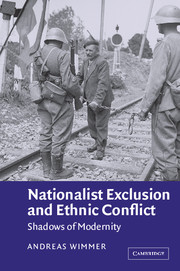3 - The making of modern communities
Published online by Cambridge University Press: 22 September 2009
Summary
How can the theory of compromise and closure enhance our understanding of nationalism, ethnic conflicts and the modern state? The view from afar that these concepts generate when used for describing modern societies helps to overcome methodological nationalisms and allows us to perceive what is usually hidden from the picture. We will see that national and ethnic identities are in no way remnants of tradition which have failed to melt away under the sun of modern republicanism. And they are far more central to the modern project than if they merely compensated for the insecurities and risks brought about by the anonymous and individualised life of our times. The formation of nation-states and the rise of nationalism and ethnicity are the products of a fundamental reorganisation of the main modes of inclusion and exclusion, of a reordering of the basic principles of membership and identity along national and ethnic lines. This chapter contains the theoretical core of this argument, and presents the main hypotheses as they unfold from, and relate to, each other, to form an integrated theoretical framework. The reasoning remains rather abstract, using ideal-types and broad generalisations. Detailed empirical and historical analysis based on specific examples will follow in later chapters.
The fallacies of a disciplinary division of labour
It has been argued repeatedly that the classical theory of modernity has a blind spot when it comes to understanding the rise of nation-states, nationalism and ethnicity (Esser 1988; Guiberneau 1997; Imhof 1997; A. Smith 1983; Thompson and Fevre 2001).
- Type
- Chapter
- Information
- Nationalist Exclusion and Ethnic ConflictShadows of Modernity, pp. 42 - 82Publisher: Cambridge University PressPrint publication year: 2002



